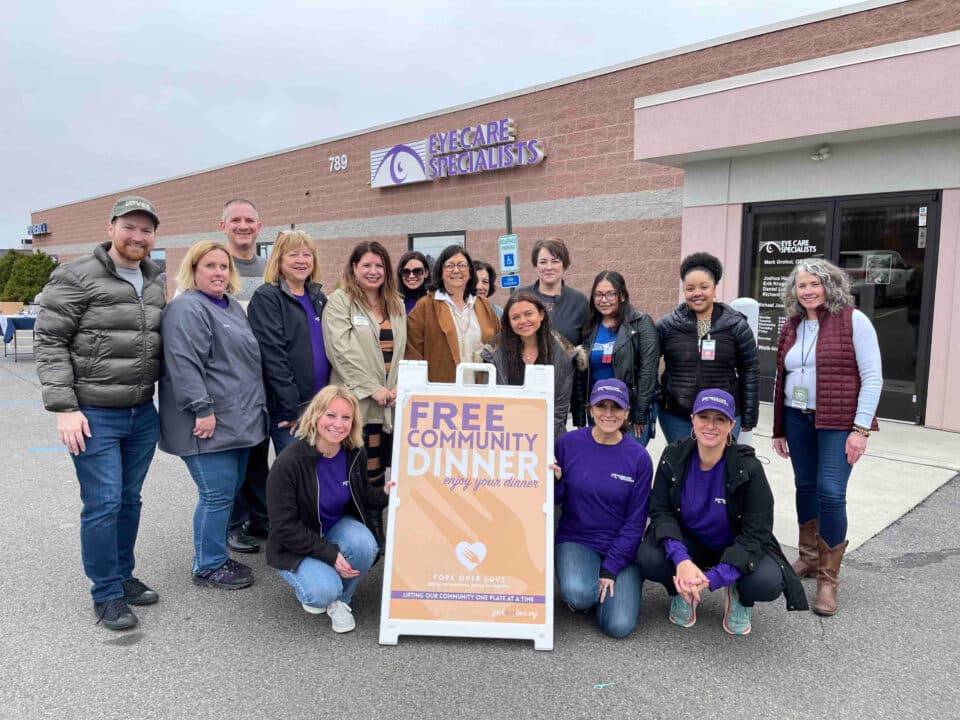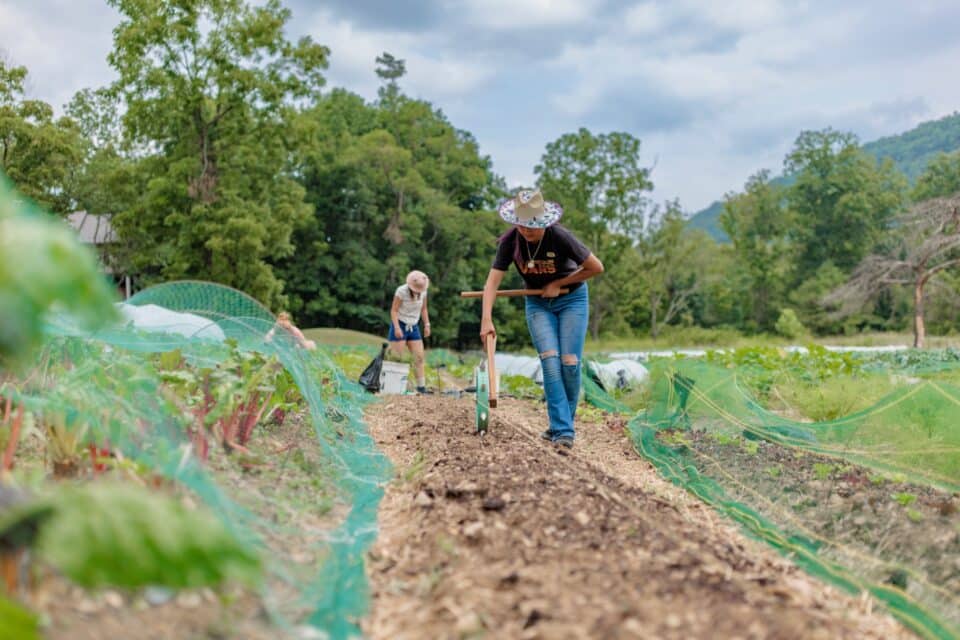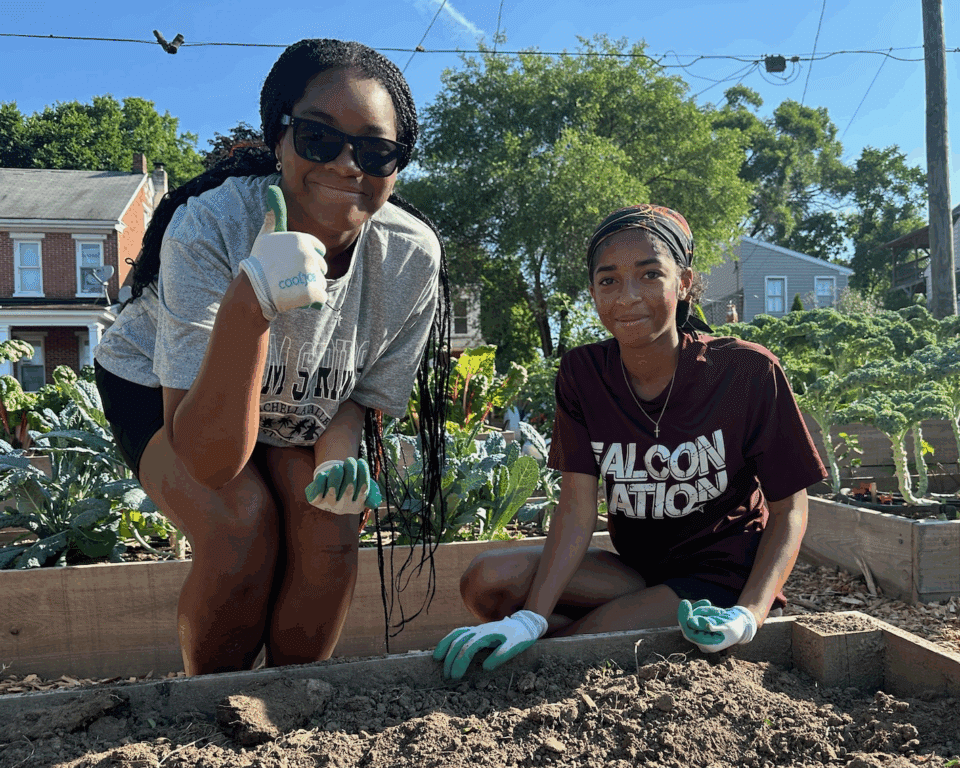By questioning the status quo, Alexandre Imbot and Eli Moraru unlocked something revolutionary. The two young founders of The Community Grocer (TCG), together with a growing coalition of neighbors, experts and advisors, have created a first-of-its-kind grocery store in Cobbs Creek, Philadelphia. “This is a physical protest to a broken system,” Imbot says. TCG will offer hot, prepared meals in exchange for Supplemental Nutrition Assistance Program (SNAP) benefits – something no food seller has done before.
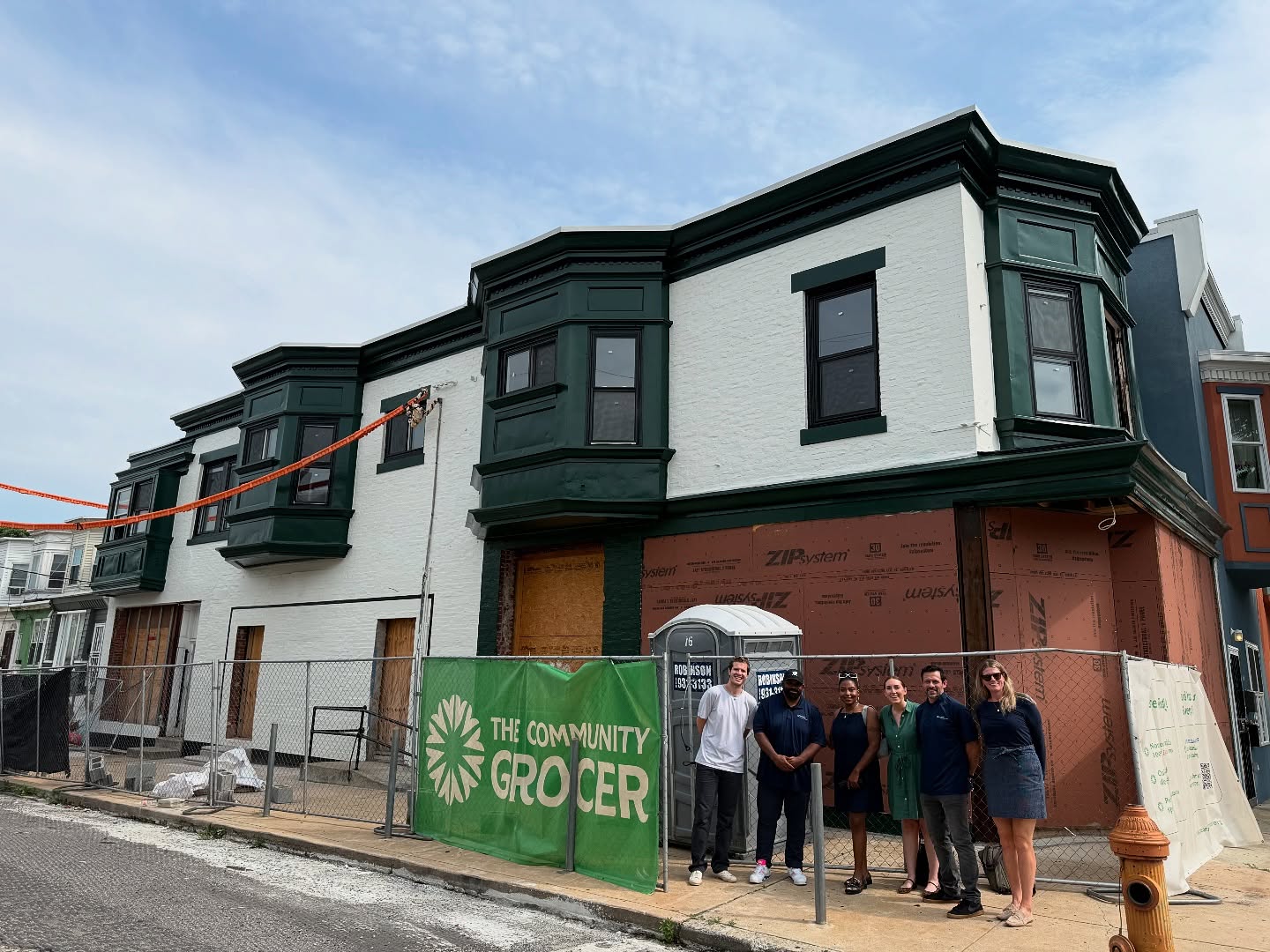
A TCG tour in July, 2025
We met with Imbot and Moraru to tour the construction site of the future grocer and community hub. We learned how they’ve worked around the rules of SNAP to create retail access to nutrition, how serendipitous twists have strengthened their vision, and how this unconventional approach landed Moraru and Impbot in national conversations about food systems.
How It All Started
During the pandemic, Moraru was disillusioned. A UPenn upperclassman, he was on the fast track to a career in corporate consulting with anxiety mounting. He lacked enthusiasm about his chosen path, which he’d only just begun to walk. One day, a lecture about cultivating one’s passions shook him up, and he abruptly cancelled his final round interview and bailed on a coveted internship opportunity. Heading into his senior year without a backup plan, he felt both terrified and free.
That same day, Imbot and Moraru connected on Instagram. The two had grown up mere miles apart in D.C., but didn’t meet until their university years in Philadelphia. Imbot had shared a call for door-to-door voter registration help in South Philadelphia and Moraru signed up. The initiative was run by Resident Action Committee II (RAC 2), whose leaders Charles Reeves Jr. and Tammy Reeves have been instrumental in Imbot and Moraru’s lives, approach and work.
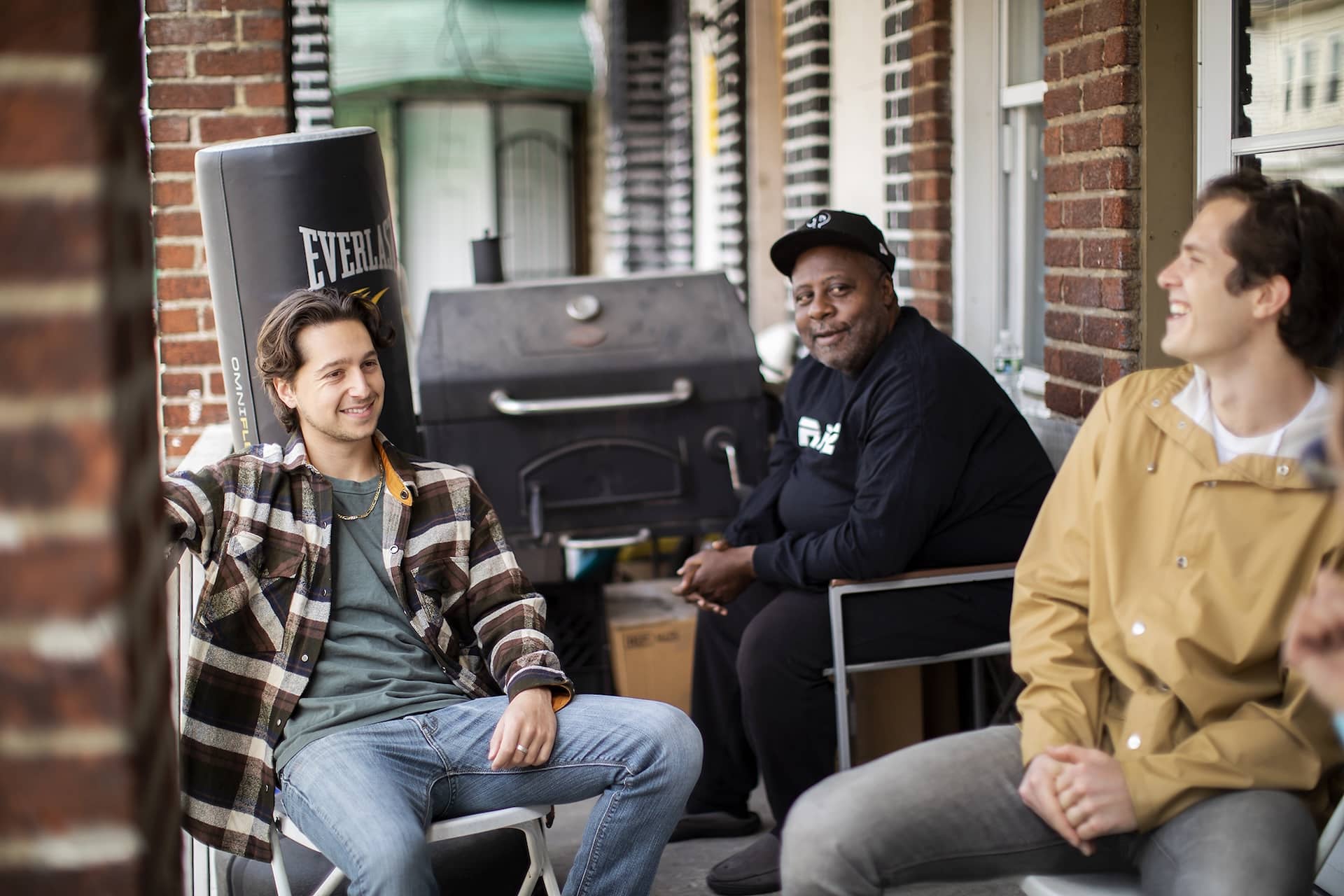
Eli Moraru, Charles Reeves Jr. and Alexandre Imbot
Imbot and Moraru spent the next year or so of the pandemic involved with various RAC 2-led projects, like park cleanups, Zoom programs and government food box distribution. They noticed that the heavy food boxes full of excess raw ingredients were cumbersome, unappealing and unrealistic, while foods at the corner store were the go-to for many neighbors using SNAP. However, “with SNAP, you can’t have hot, prepared foods,” they explain. “So kids are eating Skittles instead of eggs for breakfast.”
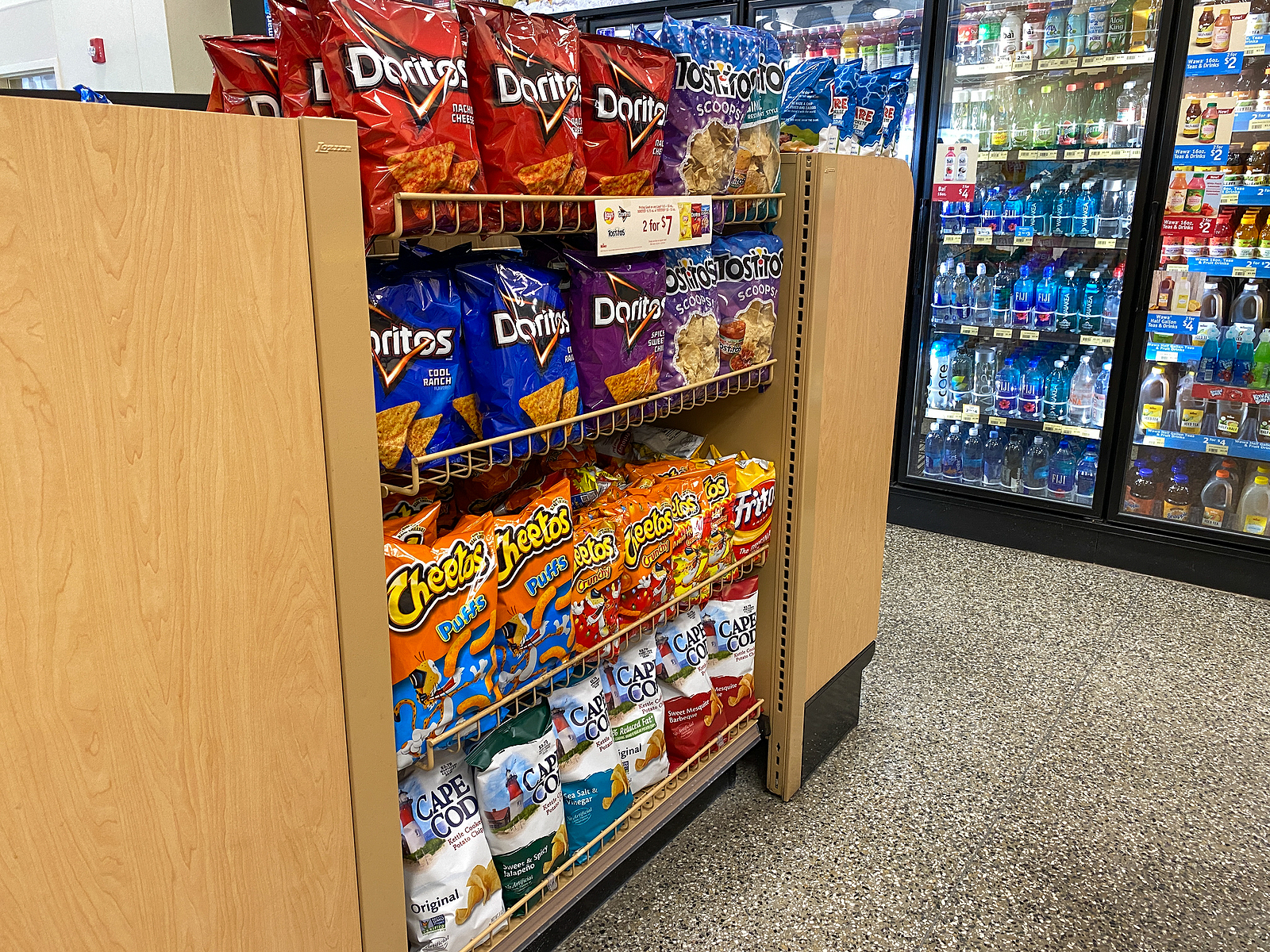
The SNAP restrictions on hot, prepared foods are meant to support home cooking and grocery shopping while preventing higher-cost uses of SNAP benefits. But, as became obvious to Imbot and Moraru, this implementation doesn’t necessarily match the needs and wants of the people using the program. For one, there’s a staggering lack of fresh, healthy grocery options for SNAP recipients in Philadelphia. Most corner stores in the city, particularly in low-income neighborhoods where SNAP is more common, sell primarily unhealthy, processed foods. The nearest full-scale grocery store is often miles away, inaccessible to those without reliable transportation. “Buses and bags and babies don’t mix,” Imbot and Moraru explain. Additionally, the time-consuming chore of regularly making home-cooked meals from scratch is highly prohibitive for members of low-income households, who are often working multiple jobs, single parents, elderly and/or without adequate kitchen resources.
Seeing kids choose candy over breakfast sandwiches, simply because of this SNAP restriction, and hearing neighbors wish they could use their benefits for hot, healthy meals got Imbot and Moraru asking questions. They dove into the Farm Bill to examine the SNAP regulations and saw the phrase “you buy/you fry prohibited” repeated throughout. This term means that SNAP retailers cannot sell raw food and then cook that food for consumers, or it’s considered hot, prepared food. If they do this, they’re likely to lose their license.
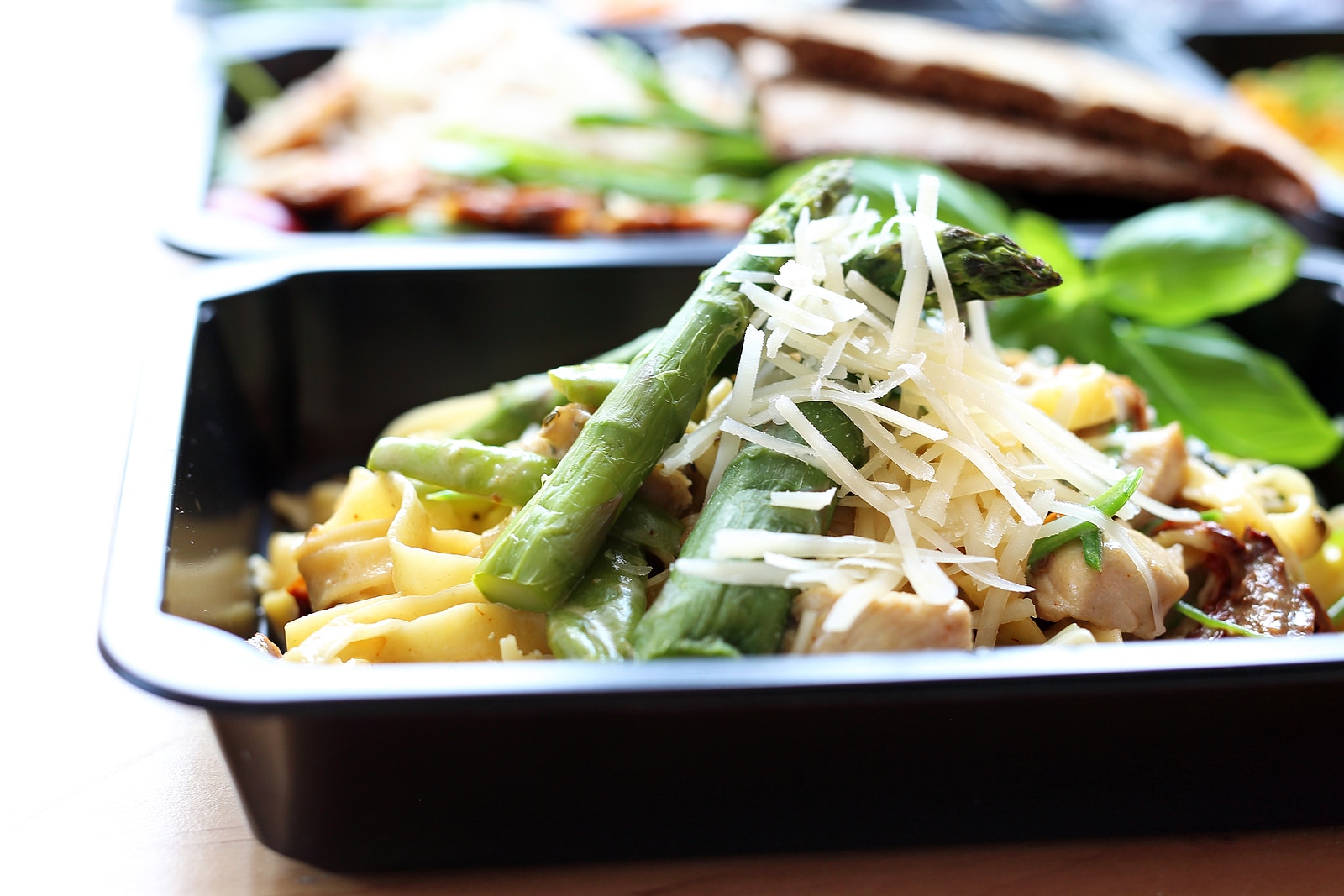
After puzzling about policy verbiage and shortcomings together for weeks, an idea struck Imbot out of the blue. “What about ‘you buy, they fry’?” he asked Moraru. What if a different entity than the seller prepared the raw ingredients off-premises as a hot meal? It made sense to them, enough so that Moraru cold-emailed the Harvard Food & Law Policy Clinic about its feasibility. Specifically, he asked for the legal meaning of “premises,” and “hot, prepared” and posed the “you buy, they fry,” model. It was a long shot but, unbelievably, scholars from Harvard wrote back.
According to the clinic’s policy experts, the ‘you buy, they fry,’ model held up. As long as the SNAP grocery seller was an entirely different business on an entirely different premises than the kitchen preparing the ingredients into a hot meal, there was no legal problem with it.
So their question became, “Where and how are we going to do this?”
The Blueprint
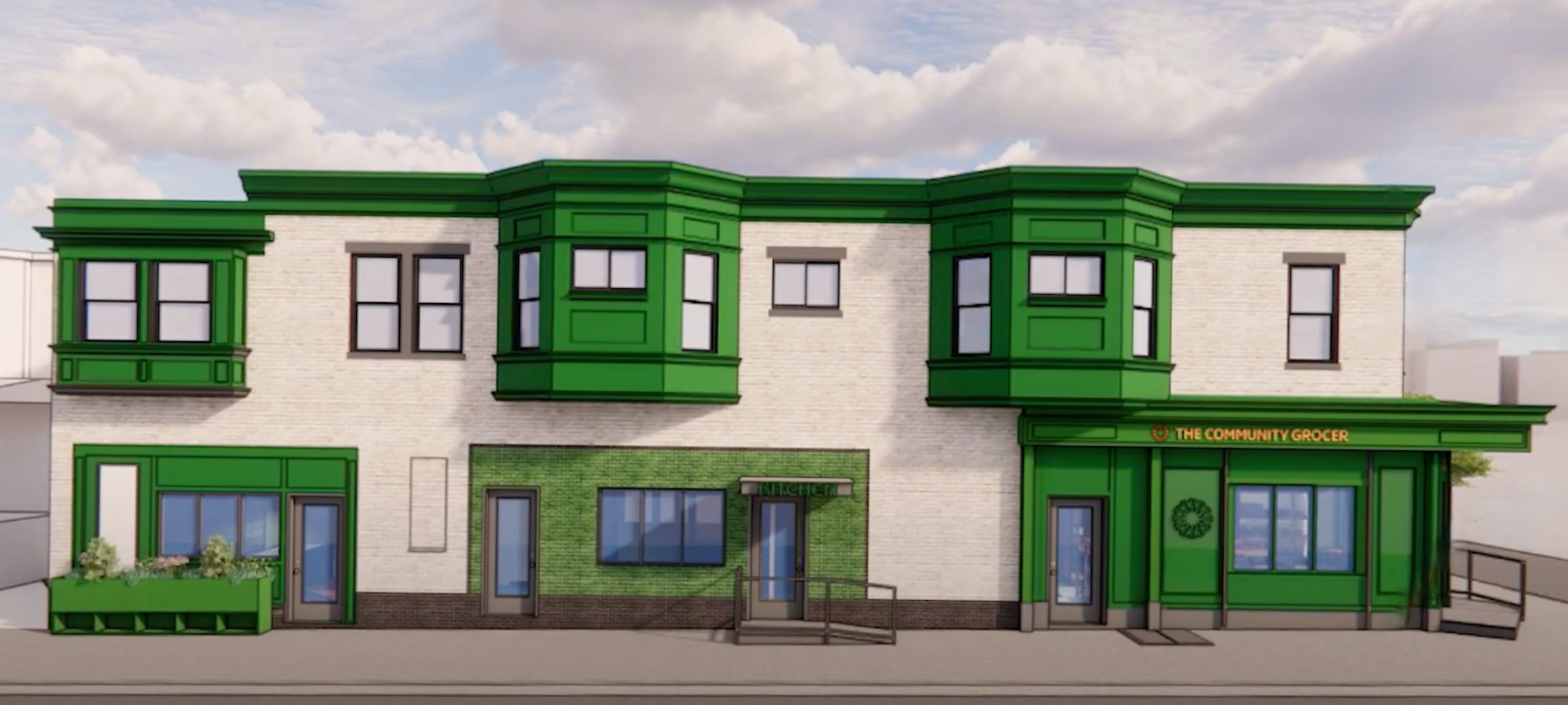
A rendering of TCG
To create the “you buy, they fry” grocer model, Imbot and Moraru had to establish two separate nonprofits. The first is the SNAP retail grocer, selling farm-fresh ingredient “kits,” with everything needed for a hot, delicious meal, yet uncooked. This is TCG Groceries. Adjacent to TCG is a separate nonprofit community kitchen, deemed the Resident Action Committee Workforce Development Kitchen. Consumers exit TCG Groceries with their ingredient kits, walk next door to the RAC kitchen, and trade in their kit for a hot, prepared version at no cost. Then, they’re on their way with something nourishing and delicious. The kit, which acted like a token in this cyclical workaround, contains untouched ingredients that can still be used for the next person.

Key to the enterprise is the total separation of the nonprofits. Legally, they’re two different organizations. TCG is run by a board, advisors and Imbot and Moraru, while the RAC kitchen belongs, essentially, to the neighborhood. Inspired by RAC 2, the kitchen is a mission-driven organization that will not only transform meal kits into hot meals, but offer ongoing culinary education, programs and events to neighbors while fostering community sovereignty.
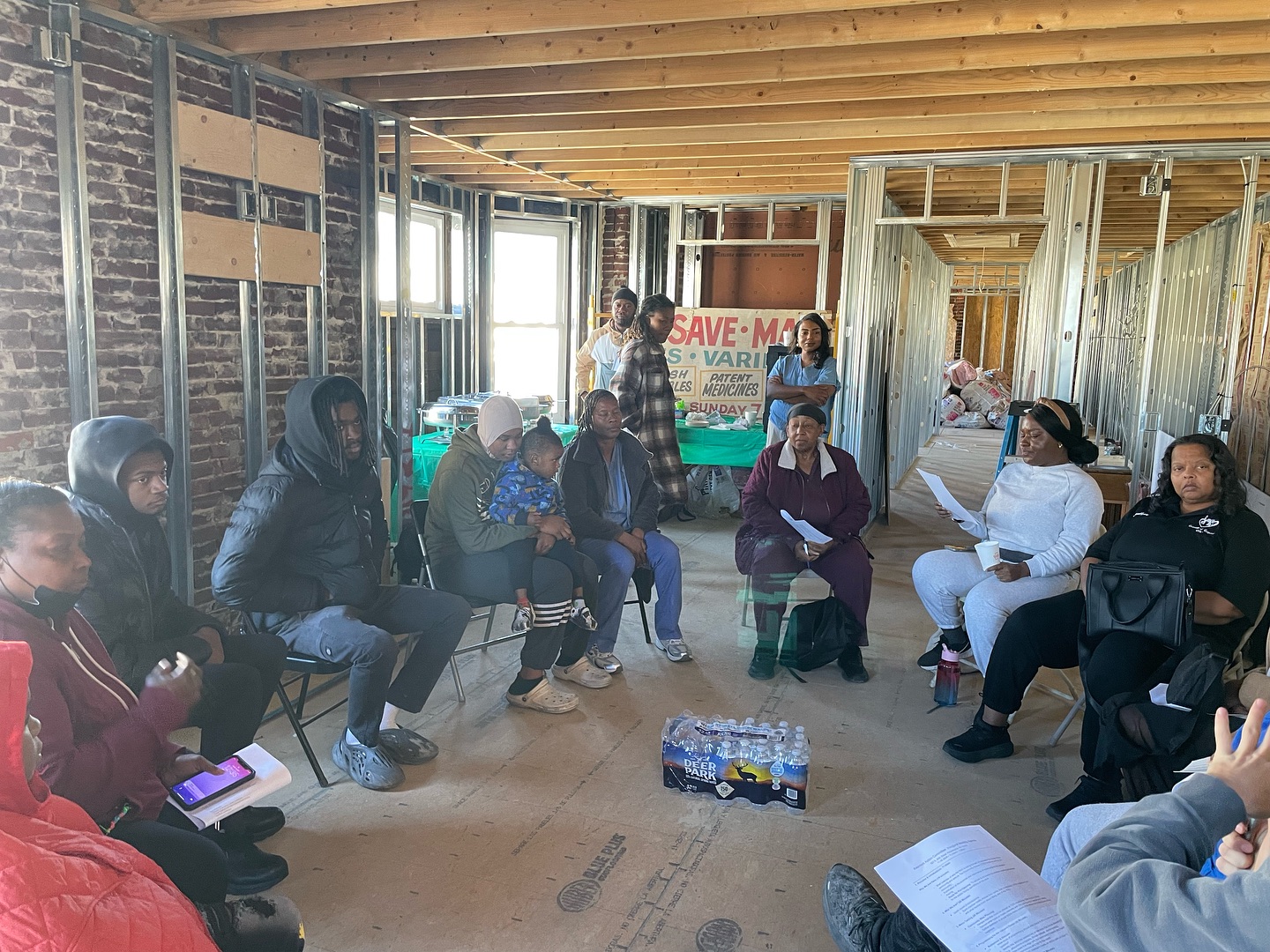
The Resident Action Committee meets for planning
Imbot and Moraru had to also physically delineate the two organizations, which will exist side by side in the space of a former single row-home, as purchasing two separate properties was out of their budget and labor scope. Tasked with creating dual premises in one space, they found the solution in a fire-rated demising wall. Designed to prevent the spread of fire between building units, this single, hardy wall legitimizes TCG and the RAC kitchen as legally separate premises.
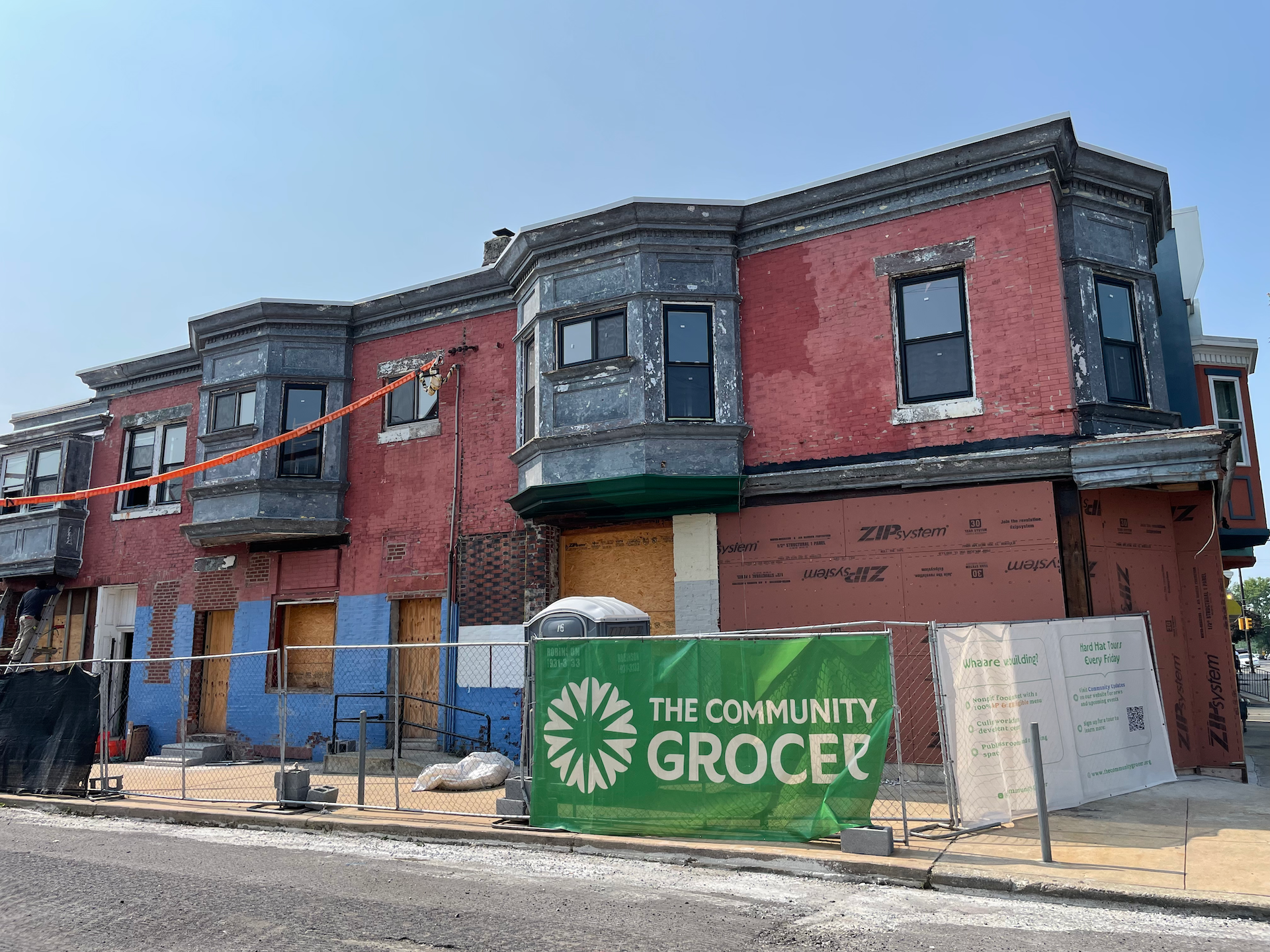
TCG in June, 2025
It was not as simple as buying a space and setting up camp. Imbot and Moraru spent months searching for the right location all over the city with Reeves Jr. and Aziza Young, who had recently signed on as Culinary Director. “It was a wild goose chase,” Imbot recalls. Through cold emails, networking, extensive grant applications and a sustainability prize from UPenn, they’ve slowly gained traction, financial backing and the instrumental support of local leaders like Speaker Joanna McClinton (who passes by with a friendly greeting during our visit), Congressman Dwight Evans, George Matysik of Share Food Program, Darryl Blakely of FMC Corporation and W.B. Saul High School and numerous other changemakers.
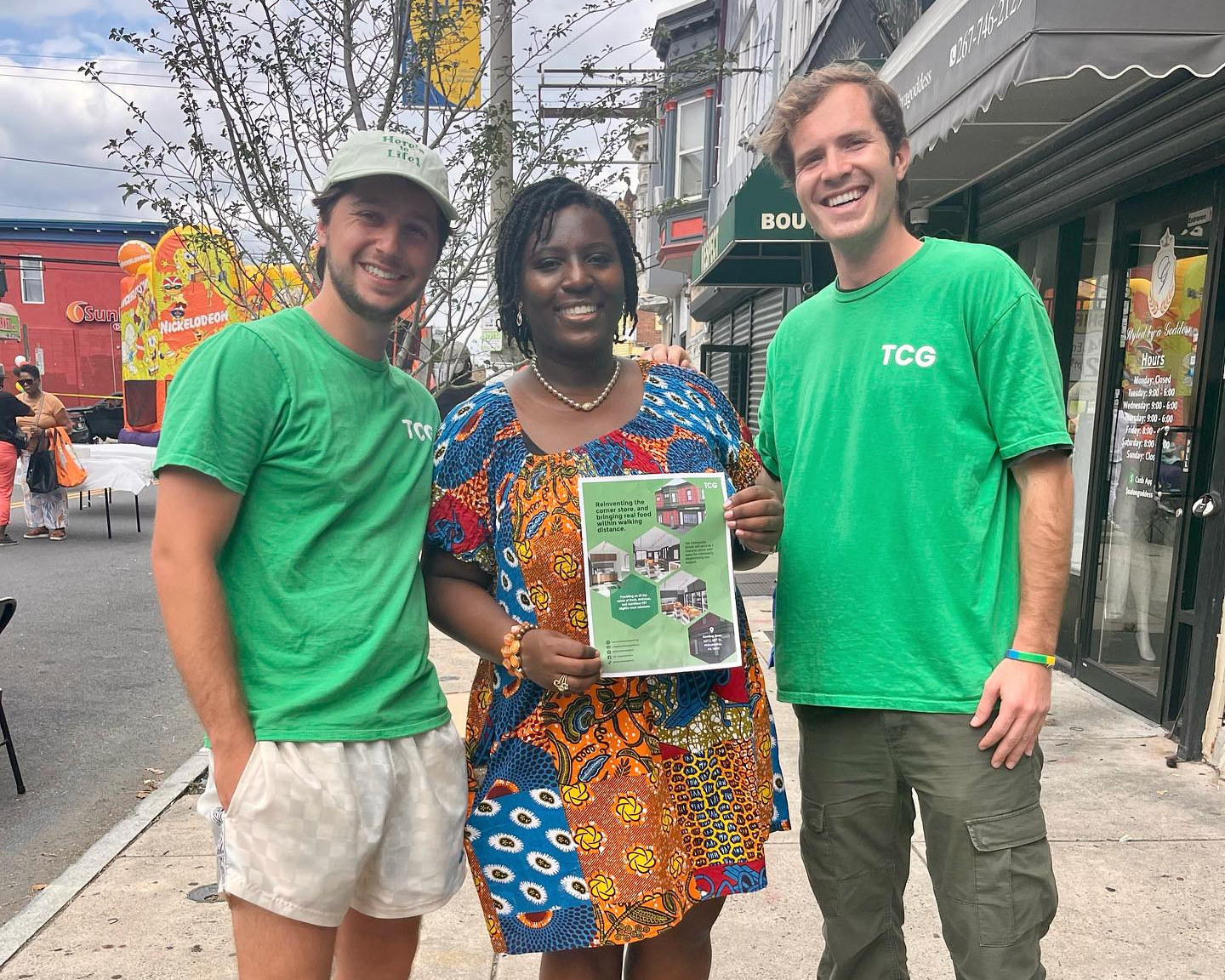
Moraru, Speaker McClinton and Imbot
Most importantly, Imbot and Moraru have earned the support of the neighbors in TCG’s Cobbs Creek location. After first finding their location, they waited six months before purchasing it to gauge community interest. “We’re two white kids from Penn. Does the community want us standing on the corner?” they asked. They got to know people, knocking on doors to invite input and support. They volunteered at Denise’s Food Pantry (which they now co-run with Laticia Thomas), spoke before a 1,000 person congregation at the Church of Christian Compassion and worked with youth at Motivated CRC. They learned that yes, the community did want this grocer, and they purchased the building (which was so misused and decrepit, it sat without competing interest that whole time). They decided to throw a groundbreaking ceremony, and recall that, “350 neighbors came out on a weekday in September.”

Moraru speaks with young visitors outside TCG.
It was around this time that the Philadelphia Inquirer published a piece on TCG with a title that made Imbot and Moraru cringe: “Penn Grads Find SNAP Hack.” The piece went viral with 16 million views overnight and what felt like principal office summons from members of Congress, the Department of Agriculture and the head of the USDA, who leads the SNAP program. Imbot and Moraru followed through, sitting down in meetings to explain the TCG vision. Ultimately, TCG gained more support than ever from these lawmakers and leaders and landed on a national stage.
Making It Happen
Progress on TCG’s construction has been slow and steady. The building, totally outdated and uninhabitable, had to be gutted. Imbot, Moraru and a team also had to dig out the basement by hand to create usable space down there. But, bit by bit, it’s coming together and is slated to open in late 2025.
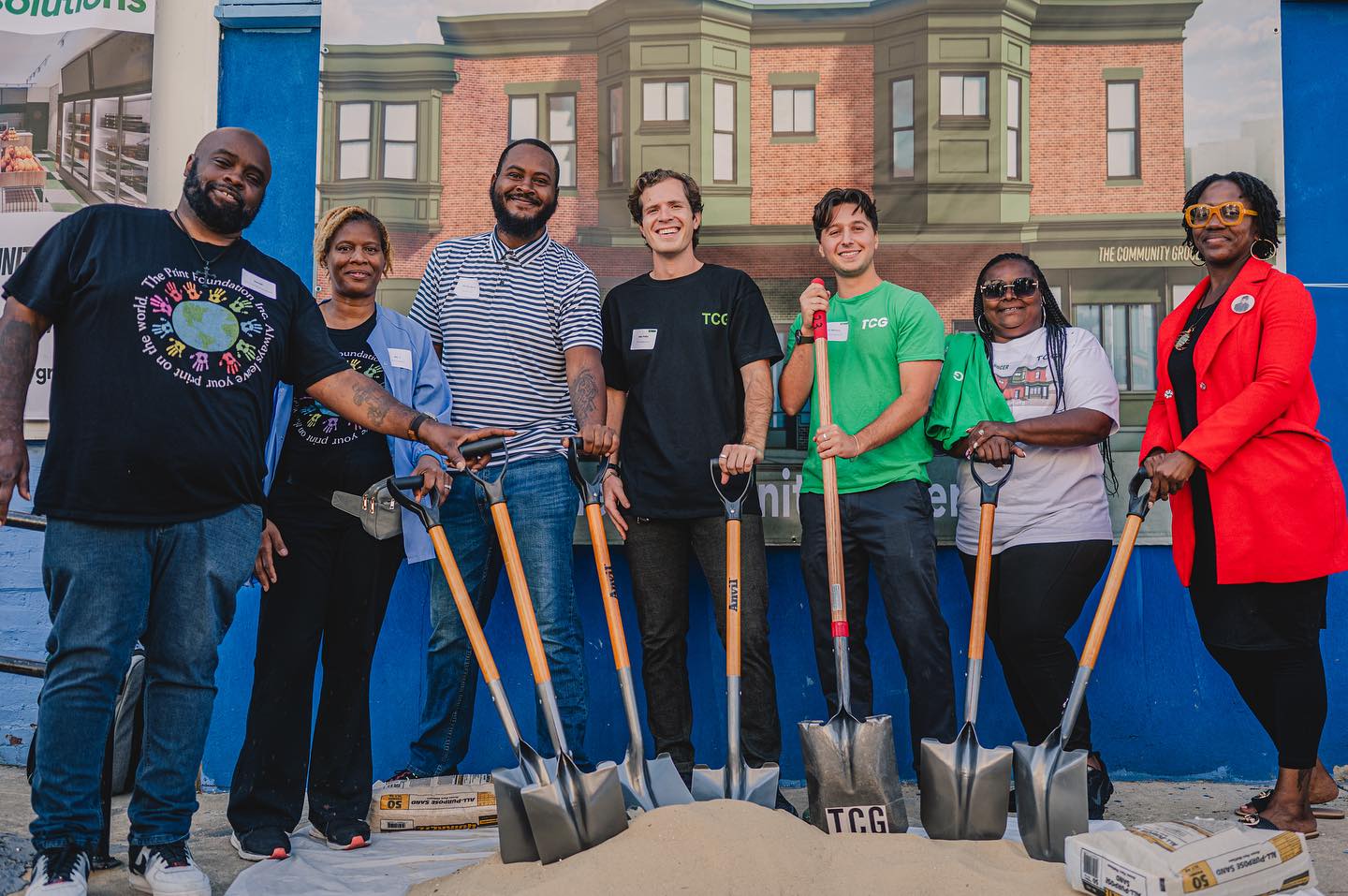
Darnell Thomas, Laticia Thomas, Darrick Harris, Imbot, Moraru, Ms. Bird and Rashida Henry at the TCG Groundbreaking Ceremony
The TCG corner store and RAC kitchen will be open to everyone. “Whether you pay with SNAP or Platinum American Express, this is for you,” says Moraru. The grocer section will have mix-and-match stations of fresh produce, proteins and grain, with a la carte SKUs. The menu design, led by Chef Aziza Young, will be based on community feedback, and the fresh produce will come from local farms like FarmerJawn and Sankofa Community Farm. “TCG will bring a healthier way of eating,” Young says. “Better food options. Better food quality.”

Members of TCG meet with Christa Barfield of FarmerJawn
The workforce development and culinary education programs offered by the RAC kitchen are open to the local community. On the second floor of the building, accessible by stairs or lift, there’s a communal education space for tutoring, after-school congregation and dining. There are also private computer and telehealth stations for neighbors to see medical professionals (remotely) with support. In keeping with the food is medicine movement, the idea is for neighbors to use the telehealth stations to “speak with a doctor, leave with a script for food and head downstairs,” Moraru explains.
What’s more, TCG will provide meals for home care companies delivering multiple in-home meals a day for seniors using Medicaid. This plan emerged after discussions with a TCG neighbor, Mr. Gary, who used to feed his bland, freezer-burnt home care meals to the birds rather than eat them. Mr. Gary has diabetes, which affects about half of the neighborhood. TCG plans to offer fresh, tasty meals with attention to diabetic concerns through the home care services.
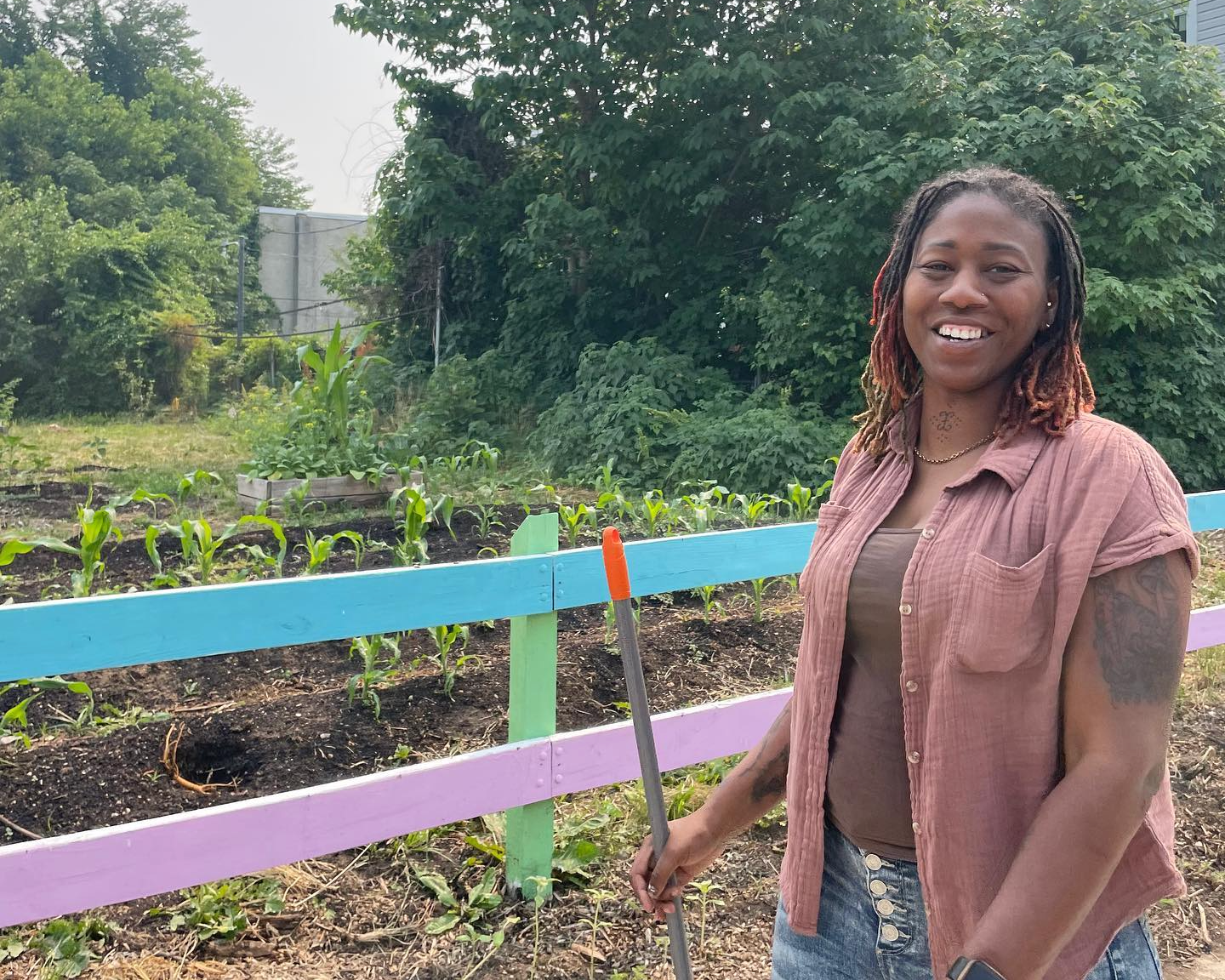
Chef and Culinary Director, Aziza Young
While Imbot and Moraru can’t ignore the buzz around this soon-to-open grocer, they plan to ease into things. “We’ll have a slow launch and then a limited holiday menu,” they explain. “It will be a loss at first, but we want to use those early months to get it right.”
Imbot and Moraru hope that TCG might one day serve as the playbook for a scalable model in other neighborhoods. But, for the foreseeable future, their focus remains on this little corner store in the heart of Cobbs Creek, where they’ll stay the course. Imbot says, “It’s been one day at a time, each step in total faith.” We wish them nothing but the best on this profound journey.

Darrick Harris, Laticia Thomas, Imbot and Moraru
To check out this incredible community grocer for yourself, sign up for a TCG Hard Hat Tour, check out the community updates and follow along on Facebook and Instagram. 627 S. 60th St., Philadelphia; (215) 278-9218.
- Feature photo: The Community Grocer
- Moraru, Reeves Jr. and Imbot photo: Eric Sucar for Penn Today
- Snack section and takeout meal photos: Bigstock
- June exterior photo: Leigh Green
- All other photos: The Community Grocer
